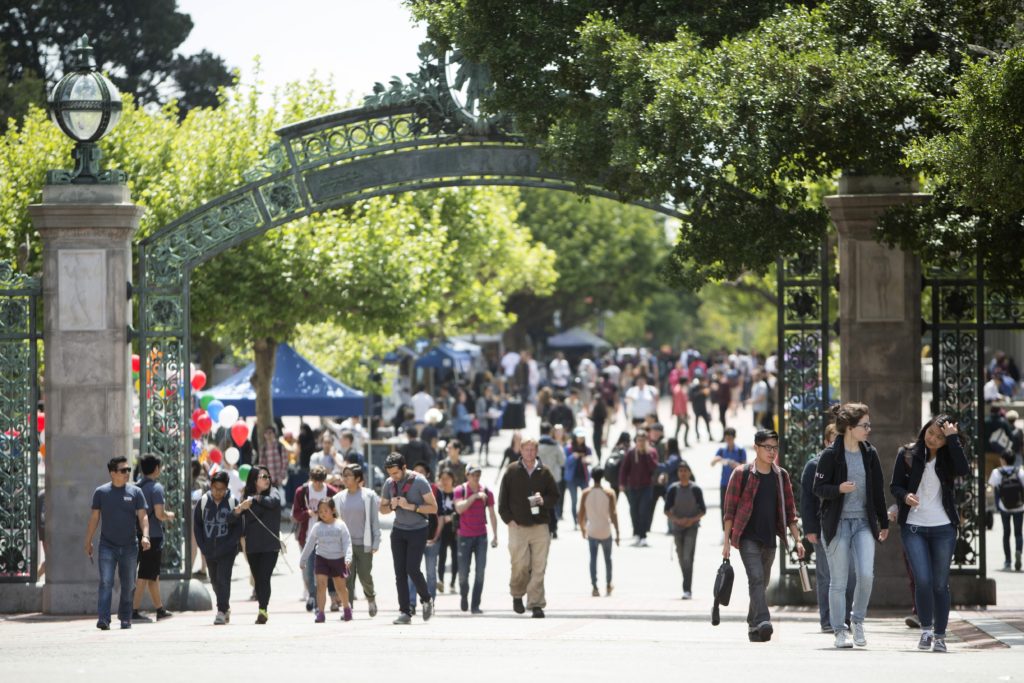
Black teachers: How to recruit them and make them stay

Lessons in higher education: What California can learn

Keeping California public university options open

Superintendents: Well-paid and walking away

The debt to degree connection

College in prison: How earning a degree can lead to a new life

Thousands of incoming freshmen and transfer students at risk of losing a spot at the University of California Berkeley because of a court ruling could get a last-minute reprieve from state lawmakers.
The California Supreme Court issued a ruling Thursday that leaves intact a lower court’s order that Berkeley must freeze enrollment at 2020-21 levels and thus enroll about 3,000 fewer students in its incoming fall class. About 5,000 fewer students would receive admissions offers this spring.
But one key lawmaker says he’s confident that the Legislature, in concert with Gov. Gavin Newsom and UC leaders, will soon have a solution that essentially offsets the court ruling.
“We’re confident that we’re going to come up with a solution to fully enroll students at UC Berkeley,” said Assemblymember Kevin McCarty, D-Sacramento, chair of the Assembly’s budget subcommittee on education finance, in an interview Thursday.
McCarty would not elaborate on what the Legislature and Newsom are planning but acknowledged that they will need to act quickly because UC Berkeley makes admissions offers to incoming freshmen by the end of March. Decisions for transfer students go out by the end of April. McCarty said there will be an announcement “in the very near future,” adding that he doesn’t expect “any drop in enrollment” at Berkeley despite Thursday’s court ruling.
Assemblymember Marc Berman, D-Menlo Park, added in a statement Thursday that he is “committed to working with my colleagues in the Legislature to create immediate and long term solutions.”
Thursday’s ruling stems from a lawsuit that was brought by a Berkeley neighborhood group arguing that the campus needs to examine the impact of enrollment growth on things like housing, noise and the environment. The lawsuit cites the California Environmental Quality Act, which requires that an environmental assessment be completed for projects that could impact the environment.
In response to the lawsuit, Alameda County Superior Court Judge Brad Seligman last year ordered Berkeley to freeze enrollment at its 2020-21 levels. To accomplish that, the campus says it will need to enroll about 3,000 fewer students in its incoming class than it was previously planning to and accept about 5,000 fewer students. Not all students who are accepted ultimately enroll.
In a statement Thursday, Berkeley Chancellor Carol Christ and Provost Catherine Koshland called the California Supreme Court’s decision “devastating news for the students who have worked so hard” to earn a spot at the campus.
“This ruling is disheartening; however, our resolve is unwavering,” they added. “We will do whatever we can to mitigate the harm to prospective students and to continue to serve our students.”
Christ and Koshland added that they would work with state leaders “to identify possible solutions” to mitigate the court decisions.
But if there “is no timely fix” that they can find, they also said the campus will prioritize acceptances for California residents as well as transfer students, indicating that out-of-state students and international students will be less likely to get admitted.
One bill has already been introduced that would make it more difficult for lawsuits like the one filed against Berkeley to be successful.
Senate Bill 886, introduced by state Sen. Scott Wiener, D-San Francisco, would exempt student and faculty housing projects at California’s public colleges and universities from the environmental quality law.
For that bill to immediately go into effect and challenge the court decision, it would need to be included in a budget trailer bill and approved by the state Senate and Assembly as well as the governor, Wiener said.
Realistically, the legislation is more of a long-term solution to prevent future housing projects and enrollment growth at campuses from being stopped by lawsuits citing the environmental law.
Wiener said he had been working on the legislation before the court rulings on Berkeley’s enrollment.
“We were working on it because of the broader issue of the lack of student housing at our public colleges and universities and high rates of student homelessness and student overcrowding. It’s just a terrible situation. So we want to do everything in our power to make it easier for UC, CSU and community colleges to build more student housing,” Wiener said.

Legislation that would remove one of the last tests teachers are required to take to earn a credential in California passed the Senate Education Committee.

Part-time instructors, many who work for decades off the tenure track and at a lower pay rate, have been called “apprentices to nowhere.”

A bill to mandate use of the method will not advance in the Legislature this year in the face of teachers union opposition.

Nearly a third of the 930 districts statewide that reported data had a higher rate of chronic absenteeism in 2022-23 than the year before.
Comments (1)
Comments Policy
We welcome your comments. All comments are moderated for civility, relevance and other considerations. Click here for EdSource's Comments Policy.
Carol Scheufele 2 years ago2 years ago
It use to be said the Republicans were at work dismantling environmental laws, now it seems the Democrats are taking front and center. With privilege comes responsibility, please don’t forget. Is one’s responsibility charity that begins at home by not overwhelming the low-end local rental market with even more bargain hunting students? Or is it as above politicians apparently feel, charity does not begin at home so fundamentally?